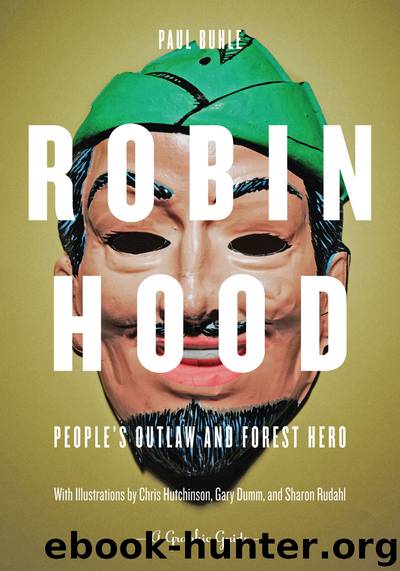Robin Hood: People's Outlaw and Forest Hero by Paul Buhle

Author:Paul Buhle
Language: eng
Format: epub
Publisher: Independent Publishers Group
Published: 2011-11-04T16:00:00+00:00
Robin and the Movies
Pyle had in a sense predicted the takeover of Robin by Americans, especially those in Hollywood. Robin Hood as cinematic hero took the field at least twice in the 1910s, but in full force with Douglas Fairbanks in 1922. Fairbanks moved acrobatically around one set after another, sword-fighting and then in deadly hand-to-hand combat, swinging from chandeliers, swimming through moats and all the other stunts that Mel Brooks would lampoon in Robin Hood: Men in Tights.
The Fairbanks version, true to the tale of the nobleman assisting the oppressed but also pledging himself to King Richard, was also important in at least one other narrative respect: romance. Filmmakers had already grasped the significance of the female lead, especially for the sake of women in the movie audience. In this version, Marian is determinedly virginal (Robin, making his escape from a tower and promising that his men may save her soon but perhaps not soon enough, lends her a dagger to use on herself … just in case) and panic-stricken at her worse-than-death potential loss. Everything about Marian depends upon Robin: no innovation here. But there is more to be said, if only because of the film’s continuing cinematic importance. Robin Hood became and still remains a Hollywood phenomenon as the social rebel beloved of the ticket-buying masses.
The first motion picture ever to have a publicized Hollywood premiere, elaborately staged at Grauman’s Egyptian Theatre on October 18, 1922, Douglas Fairbanks in Robin Hood was also one of the most expensive films yet made. Fairbanks himself, under a pen name, adapted the screenplay from a novel, and had built a faux-twelfth-century Nottingham castle-village at the Pickford-Fairbanks Studio. Sets, some designed by Frank Lloyd Wright’s son, Lloyd Wright, followed the logic of director Allan Dwan, who was himself an important modernist set designer. Releasing company United Artists, a company owned by Fairbanks, Pickford, Chaplin, and Griffith, bet its fortune on this project—and won.
Only a still more remarkable film could out-do Fairbanks’s silent classic. The Adventures of Robin Hood (1938), costarring a heart-rending Olivia de Havilland as Maid Marian, amplified a wealth-redistributionist Robin Hood generally absent from the Fairbanks version. Leading man Flynn, reputed to be an early 1930s pro-Fascist but always more interested in chasing women (all four services turned him down for wartime duty, because he had heart problems but also numerous venereal diseases) and boozing, was soon to become the anti-Fascist screen hero several times over. Before the end of his life (at fifty), Flynn pronounced himself, on prime-time television, to be a drinking buddy of Fidel Castro’s, that other romantic Robin Hood-style hero, although insisting that they had never talked politics.
Meanwhile, playing Maid Marian, de Havilland was perfection. The noblewoman, at first resentful and politically conservative, is won from her aristocratic beliefs by Robin’s showing her the misery wrought by the Norman occupiers. She follows her heart and her political growth step by step into romance and partisanship. Very much her own person, this Maid Marian is on
Download
This site does not store any files on its server. We only index and link to content provided by other sites. Please contact the content providers to delete copyright contents if any and email us, we'll remove relevant links or contents immediately.
Cecilia; Or, Memoirs of an Heiress — Volume 1 by Fanny Burney(32536)
Cecilia; Or, Memoirs of an Heiress — Volume 2 by Fanny Burney(31933)
Cecilia; Or, Memoirs of an Heiress — Volume 3 by Fanny Burney(31925)
The Great Music City by Andrea Baker(31908)
We're Going to Need More Wine by Gabrielle Union(19028)
All the Missing Girls by Megan Miranda(15915)
Pimp by Iceberg Slim(14476)
Bombshells: Glamour Girls of a Lifetime by Sullivan Steve(14046)
For the Love of Europe by Rick Steves(13845)
Talking to Strangers by Malcolm Gladwell(13339)
Norse Mythology by Gaiman Neil(13331)
Fifty Shades Freed by E L James(13225)
Mindhunter: Inside the FBI's Elite Serial Crime Unit by John E. Douglas & Mark Olshaker(9310)
Crazy Rich Asians by Kevin Kwan(9271)
The Lost Art of Listening by Michael P. Nichols(7485)
Enlightenment Now: The Case for Reason, Science, Humanism, and Progress by Steven Pinker(7303)
The Four Agreements by Don Miguel Ruiz(6735)
Bad Blood by John Carreyrou(6608)
Weapons of Math Destruction by Cathy O'Neil(6257)
